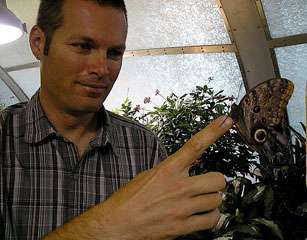Impending species loss opens 'compelling' genetic discussion

Somewhere between the ideas of resurrecting extinct species and engaging in genetic engineering of existing ones lies space for a conversation about a third potential approach to fending off conservation disaster.
"Facilitated adaptation" is the name given this concept, and the suggestion to talk about it comes in part from Brett Dickson, assistant research professor at Northern Arizona University.
As coauthor of a comment piece in Nature, Dickson helps bring the topic to the forefront of scientific discussion. As a researcher, his dual affiliation and multiple pursuits illustrate the complexity of proactively facing the potential loss of 40 percent of species by 2050.
At NAU, Dickson directs the Lab of Landscape Ecology and Conservation Biology in the Landscape Conservation Initiative. But he is also president and chief scientist of Conservation Science Partners, a nonprofit organization that brings together experts in various disciplines to address conservation issues such as habitat fragmentation, landscape connectivity and the spread and distribution of infectious diseases across animal populations.
Considering the looming loss of species, Dickson said it is surprising that facilitated adaptation—essentially, taking a genetically proactive approach to improve the prospects of a particular animal population—has not gotten much attention.
"My colleagues and I thought this would be a compelling idea ready for debate, although it's not necessarily ready to be put immediately into widespread practice," Dickson said.
Rather than taking the "very challenging" step of physically moving animal populations threatened by climate change, which has been tried with mixed success, facilitated adaptation entails "moving adaptive alleles from one population to another," Dickson said. Alleles determine traits (such as a thick coat of hair versus thin in mammals). So traits that bolster a well-adapted population of a particular species could be transferred to a population under stress.
From a technical standpoint, Dickson said, the science is already being demonstrated with genetically modified organisms in the plant world. Although facilitated adaptation does not go as far as genetic engineering, the Nature coauthors agree that even such a mitigated step would be drastic, with profound ethical implications.
"If we feel strongly as a society this is something we should explore, then perhaps piloting a program would be warranted," Dickson said, with a caveat: "Facilitated adaptation should not be considered a substitute for preventing the loss of habitats or the species that depend on them."
But that's an issue for science and the public to decide after a thorough vetting. For now, Dickson is turning his focus back to efforts he has pursued throughout his career, which puts his dual roles into play; he is drafting language to formalize CSP's already-established connection to NAU.
"The Nature article is part of a larger set of objectives that ties into Conservation Science Partners and me personally," Dickson said. "We're trying to raise the bar for conservation."
More information: www.nature.com/news/ecology-ge … conservation-1.13790
Journal information: Nature
Provided by Northern Arizona University
















